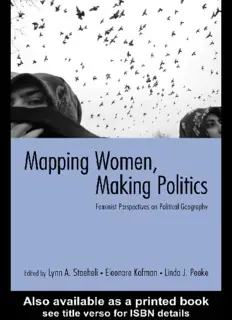
Feminist Perspectives on Political Geography PDF
Preview Feminist Perspectives on Political Geography
Mapping Women, Making Politics Mapping Women, Making Politics Feminist Perspectives on Political Geography Edited by Lynn A. Staeheli • Eleonore Kofman • Linda J. Peake ROUTLEDGE NEW YORK AND LONDON Published in 2004 by Routledge 270 Madison Avenue New York,NY 10016 www.routledge-ny.com Published in Great Britain by Routledge 2 Park Square Milton Park,Abingdon Oxon OX14 4RN U.K. www.routledge.co.uk Copyright © 2004 by Taylor & Francis Books,Inc. Routledge is an imprint ofthe Taylor & Francis Group. This edition published in the Taylor & Francis e-Library, 2005. “To purchase your own copy of this or any of Taylor & Francis or Routledge’s collection of thousands of eBooks please go to www.eBookstore.tandf.co.uk.” All rights reserved.No part ofthis book may be reprinted or reproduced or utilized in any form or by any electronic,mechanical,or other means,now known or hereafter invented, including photocopying and recording or any other information storage or retrieval system, without permission in writing from the publisher. Library ofCongress Cataloging-in-Publication Data Mapping women,making pol itics:feminist perspectives on political geography/edited by Lynn A.Staeheli,Eleonore Kofman,Linda Peake. p.cm. Includes bibliographical references and index. ISBN 0-415-93448-6 (hb:alk.paper)—ISBN 0-415-93449-4 (pb:alk.paper) 1.Feminist political geography.2.Sex role—Political aspects. 3.Feminist theory—Political aspects.I.Title:Feminism and political geography. II.Staeheli,Lynn A.III.Kofman,Eleonore.IV.Peake,Linda,1956- 2004005601 ISBN 0-203-32851-5 Master e-book ISBN JC321.M36 2004 320.1(cid:1)2(cid:1)082—dc22 Contents Preface vii 1 Mapping Gender,Making Politics:Toward 1 Feminist Political Geographies LYNN A.STAEHELI AND ELEONORE KOFMAN 2 Contextualizing Feminist Political Theory 15 PATRICIA M.MARTIN 3 Mapping Feminisms and Difference 31 RICHA NAGAR 4 From Dualisms to Multiplicities: 49 Gendered Political Practices RUTH FINCHER 5 Placing Gendered Political Acts 71 MEGHAN COPE 6 Doing Feminist Political Geographies 87 JOANNE SHARP 7 Development,Postcolonialism,and Feminist 99 Political Geography NINA LAURIE,WITH PAMELA CALLA 8 Critically Feminist Geopolitics 113 MARY GILMARTIN AND ELEONORE KOFMAN 9 Gendered Globalization 127 SUSAN M.ROBERTS 10 Territory,Territoriality,and Boundaries 141 DORIS WASTL-WALTER AND LYNN A.STAEHELI 11 Embodied Nationalisms 153 TAMAR MAYER 12 The (Geo)Politics ofGendered Mobility 169 JENNIFER HYNDMAN 13 Crossing Borders:Gender and Migration 185 PARVATI RAGHURAM v vi • Contents 14 Social Movements,Protest,and Resistance 199 JOAN FAIRHURST,MAANO RAMUTSINDELA, AND URMILLA BOB 15 A Gendered Politics ofthe Environment 209 JOSEPA BRÚ BISTUER AND MERCÈ AGÜERA CABO 16 Making Feminist Sense ofthe State and Citizenship 227 VERA CHOUINARD 17 Framing Feminist Claims for Urban Citizenship 245 GERDA R.WEKERLE 18 Feminizing Electoral Geography 261 ANNA J.SECOR References 273 Contributors 305 Index 309 Preface This book emerged out ofyears ofdiscussion among feminists who are inter- ested in political geography.Many ofus noted with excitement the research by feminists that cast politics and political geography in a new light. We were thrilled to read the research but were puzzled and somewhat troubled by the sense that feminist perspectives had not been recognized by many in the field. A series ofpanels at the annual meetings ofthe Association ofAmerican Geo- graphers in Pittsburgh convinced us it was time to highlight feminism’s con- tributions to the subdiscipline. Mapping Women, Making Politics: Feminist Perspectives on Political Geographyis an attempt to recognize the breadth and vitality of feminist contributions in this field.We hope that this volume goes some way to demonstrate the ways in which fundamental concepts within po- litical geography are enriched—and in many ways unsettled—by feminist per- spectives. We wish to thank several people who made this collection possible.First and foremost,ofcourse,are those feminists who have brought their perspec- tives to bear on pressing political issues,demonstrating both the importance of gender in shaping political issues and ideas and the role of feminism in helping to make sense of them.We believe the authors in this volume have played an important role in highlighting those contributions.We also thank David McBride, acquisitions editor at Routledge, for his enthusiasm for the project and his patience as we confronted numerous delays.Finally,we thank Sugandha Brooks for her assistance in putting together the book,working her way through references, computer glitches, and the inevitable confusion of compiling so many chapters with editors and contributors from different places. Lynn A.Staeheli,Boulder,Colorado Eleonore Kofman,London Linda Peake,Toronto vii 1 Mapping Gender, Making Politics: Toward Feminist Political Geographies LYNN A.STAEHELI AND ELEONORE KOFMAN Belonging and inclusion are contested terms. They also are terms that have particular resonance for political geographers at the beginning ofthe twenty-first century,because they speak to the processes ofdemocratization and the incor- poration ofpolitical subjects as citizens.The End ofHistory and the Last Man (Fukayama 1992) and The Third Wave (Huntington 1991) declared that democracy was on the verge ofsweeping the globe with the promise ofexpanded procedures and institutions to ensure the rights ofuniversal citizenship.In the context ofproclamations about democratization,long-standing debates about political inclusion and belonging took on increased importance, because it seemed that beyond the establishment of formal institutions of democracy, marginalization and exclusion of particular ideas,people,and social groups continued.As became increasingly clear,the exclusion characterizing political processes also was indicative of processes of knowledge production,because the experiences and perspectives ofmarginalized groups seemed absent from the study ofpolitical processes and geographies. It is in this context that we want to situate Mapping Women,Making Politics: Feminist Perspectives on Political Geography.We intend the book to be a step in demonstrating the ways in which feminist perspectives on politics and political geography contribute to a better,richer understanding of political processes, activities,and behaviors.But we also hope that the book will draw attention to the considerable work by feminists that has not been included in or incorpo- rated into political geography’s vision ofitself.In so doing,we use this intro- ductory chapter to provide a short overview ofpolitical geography,highlighting questions ofhow it is defined and bounded.The marginalization—and even ex- clusion—ofgender and offeminist perspectives has yielded a field that is par- tial in the understandings and knowledges produced within it. We outline what a specifically feminist political geography could entail through a consid- eration of key concepts and issues.In so doing,we demonstrate the impor- tance ofsituated knowledges that are derived from the lives and experiences of 1
